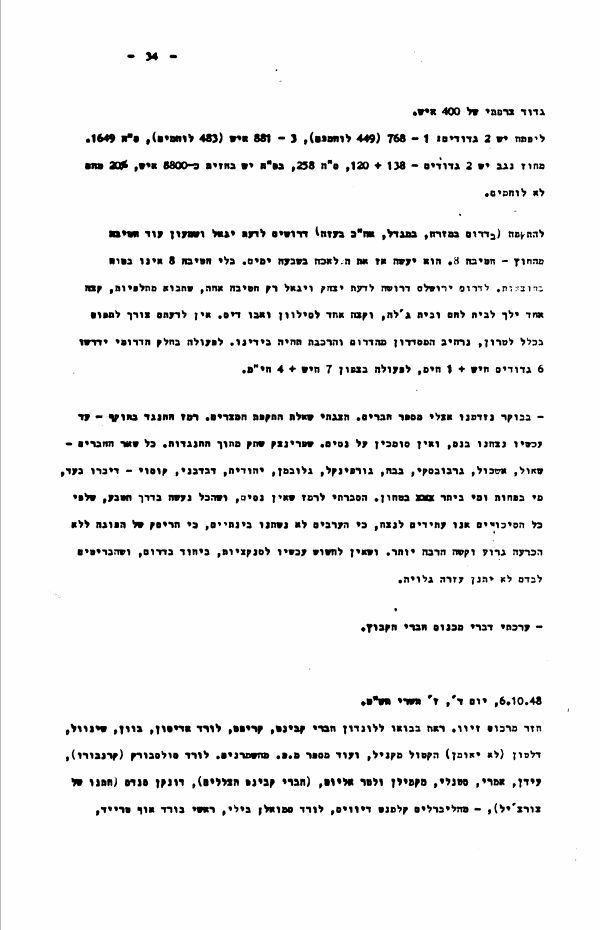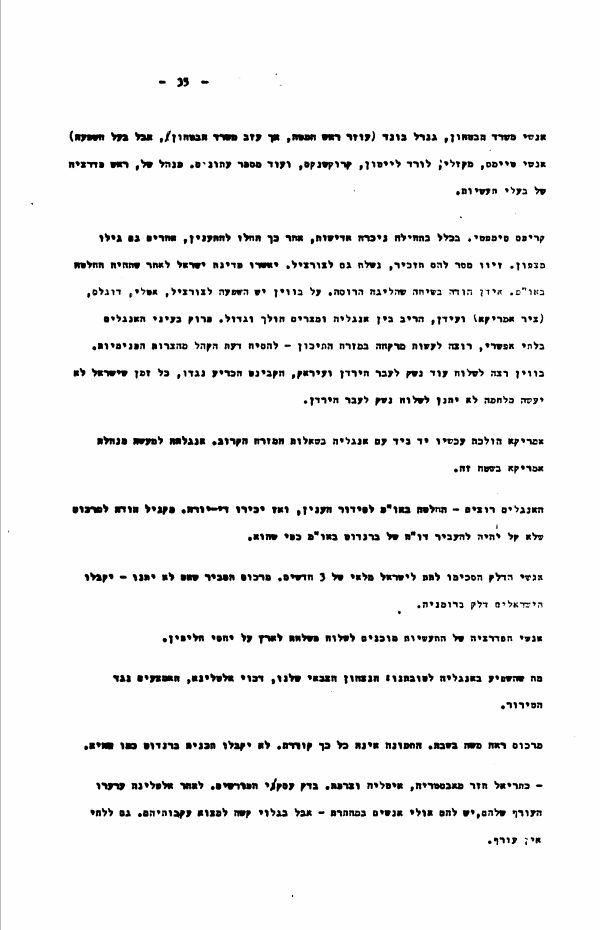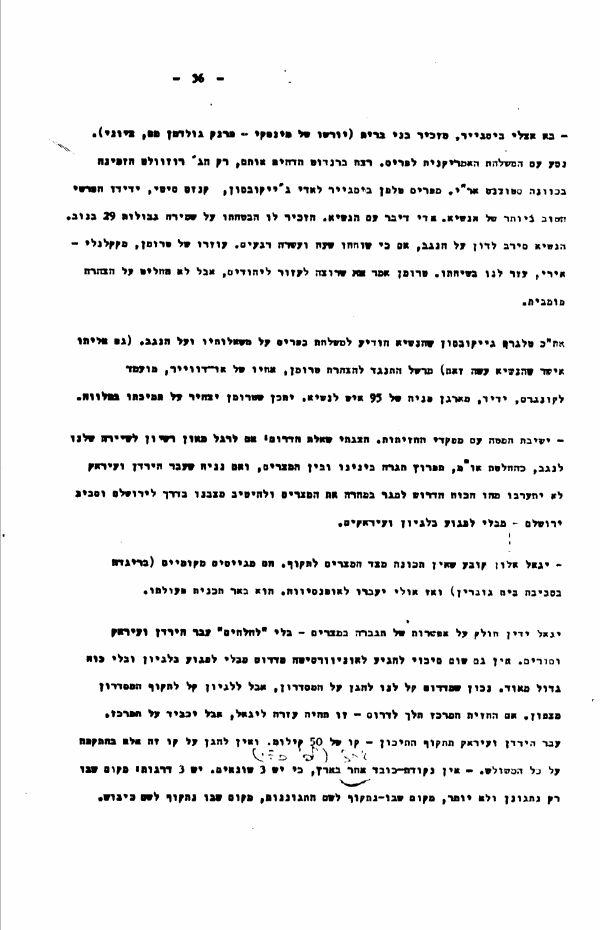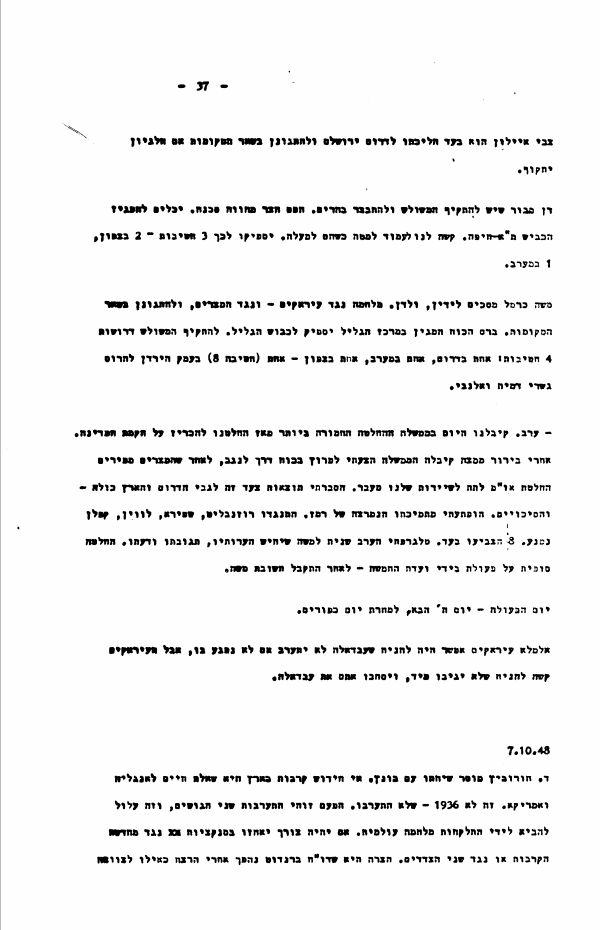1
of
05.10.1948
224876
Wednesday, October 6, 1948 Marcus Sieff returned. After arriving in London he saw Cabinet members, [Stafford] Cripps, Lord Addison, [Aneurin] Bevan, [Emanuel] Shinwell, [Hugh] Dalton, Hector McNeil, and a number of Conservative MPs [members of Parliament]: Lord Salisbury (Cranborne), [Anthony] Eden, [Leopold] Amery, [Oliver] Stanley, Harold Macmillan, Walter Elliot (members of the shadow cabinet), Duncan Sandys (Churchill’s son-in-law). From the Labourites Clement Davies, Lord Samuel; [Harold] Beeley [advisor to Bevin], heads of the Board of Trade, members of the defense ministry [War Office], General Bond (assistant to the chief of staff, left the defense ministry, but is influential), staff members of the Times, McNally [sp.], Lord Layton [sp.], Crookshanks, and a number of other newspapers, the director of Shell, the head of the Manufacturers’ Association. Cripps is sympathetic. In general at first there was apathy, then there started to be interest, [and] others also demonstrated a conscience. Sieff gave them a memorandum, which was also sent to [Winston] Churchill. They’ll affirm [recognize] the State of Israel after there’s a UN resolution. Eden acknowledged in conversation that the [Arab] League is destroyed. Churchill, [Clement] Attlee, [Lewis] Douglas (American ambassador), and Eden have sway over Bevin. The quarrel between England and Egypt is intensifying. [King] Farouk is impossible in the eyes of the English, wants to stir things up in the Middle East – to distract public opinion from domestic problems. Bevin wanted to send more weapons to Transjordan and Iraq, [and] the Cabinet ruled against him: as long as Israel doesn’t wage war, they won’t allow weapons to be sent to Transjordan. America is now proceeding hand-in-hand with England on matters of the Near East. In effect England is managing America in this area. The English want a resolution in the UN to sort out the issue, and then they’ll recognize [Israel] de jure. McNeil admitted to Marcus that it won’t be easy to transmit Bernadotte’s report in the UN as it is. The fuel people agreed to give Israel reserves for 3 months. Marcus explained that if they don’t provide it – the Israelis will get fuel in Romania. Members of the Manufacturers’ Association are prepared to send a delegation to the country for trade relations. What swayed things in our favor in England: our military victory, suppressing the Altalena, measures against terrorism [after Bernadotte’s assassination]. Marcus saw Moshe [Sharett] on Saturday. The picture is not so bleak. They won’t adopt Bernadotte’s plan as it is. – Katriel [Katz] returned from Austria, Italy, and France. He looked into the business of the secessionists. After the Altalena their backing [civilian support?] was weakened. They might have people in the underground – but out in the open it’s hard to find their traces. LEHI also lacks backing. – [Maurice] Bisgyer, secretary of B’nai B’rith, came to see me (the successor of [B’nai B’rith President Henry] Monsky [is] Frank Goldman, a Zionist). He’d traveled with the American delegation to Paris. The Bernadotte assassination stunned them. Only Mrs. [Eleanor] Roosevelt deliberately [demonstrably] invited an Eretz-Israeli student. From Paris Bisgyer telephoned Eddie Jacobson, of Kansas City, the president’s best personal friend. Eddie spoke with the president, reminded him of his promise regarding preservation of the borders of November 29. The president refused to discuss the Negev, although they spoke for an hour and 20 minutes. Truman’s advisor, McKinney, Irish, helped us in what he said [McKinney was chairman of the US Democratic National Committee]. Truman said that he wants to help the Jews, but hasn’t decided on a public announcement. Afterwards [Eddie] Jacobson telegraphed [to say] that the president had informed the [American] delegation in Paris regarding his wishes and regarding the Negev (Eliahu [Epstein-Elath, Israel’s ambassador to the US] also confirmed that the president had done so). Marshall objected to an announcement by Truman. [New York Mayor] O'Dwyer’s brother, a congressional candidate, a friend, is organizing an appeal by 95 people to the president. It’s possible that Truman will announce his support for a loan. – Staff meeting with the front commanders. I presented the question of the south: whether in the event of [an Egyptian] refusal to permit our convoy to the Negev, per the UN resolution, a clash would break out between us and the Egyptians, and supposing Transjordan and Iraq don’t get involved, what is the force necessary to quickly defeat Egypt and improve our situation on the road to Jerusalem and around Jerusalem – without striking at the Legion and the Iraqis. Yigal Allon holds that there is no plan on the part of the Egyptians to attack. They’re recruiting locals (a brigade around Beit Jubrin), and then might shift to the offensive. He explained his action plan. Yigael Yadin disputes the possibility of a skirmish in Egypt – without “inciting” Transjordan and Iraq, and the Syrians [to war]. Nor is there any possibility of reaching the university from the south without attacking the Legion and without a very large force. It’s true that from the south it’s easy for us to defend the corridor, but it’s easy for the Legion to attack the corridor from the north. If the Center [“Merkaz”] Front goes south – it will be helpful for Yigal [Allon], but will make things hard for the Center. Transjordan and Iraq will attack the Central [“Tichon”] Front – a line of 50 km, and there’s no defending this line other than by attacking the entire Triangle. There isn’t just one center of gravity in the country, because there are 3 enemies. There are 3 levels: a location where we only defend ourselves and no more, a location where we attack for the sake of defense, a location where we attack for the sake of occupation. Zvi Ayalon supports are going to southern Jerusalem and taking a defensive position elsewhere, if the Legion attacks. Dan [Even] believes that it’s necessary to attack the Triangle and take up fortified positions in the hills. The narrow strip [in our hands] poses a danger. They can shell the Tel Aviv-Haifa road. It’s hard for us to hold on below when they’re above. 3 brigades will suffice for this – 2 in the north, one in the west. Moshe Carmel agrees with Yadin and Dan [Even]. War against Iraqis – and against the Egyptians, and defensiveness elsewhere. However, the defensive force in the central Galilee will suffice for the conquest of the Galilee. Attacking the Triangle requires 4 brigades: one in the south, one in the west, one in the north – one (the 8th Brigade) in the Jordan Valley [to breach the Jordan Valley southward], to destroy the Damiyah and Allenby bridges. – Evening. Today we took the gravest decision we’ve taken since we decided to declare the founding of the state. After an exhaustive consultation the government adopted my decision to breach a path to the Negev by force, given that the Egyptians are violating the UN resolution to allow our convoys transit. I explained the consequences of this step for the south and the entire country – and the odds. I was surprised by [David] Remez’s vigorous support. Those opposing were Rosenblüth [Pinchas Rosen], [Moshe] Shapira, [Meir] Levin. [Eliezer] Kaplan abstained. 8 voted in favor. I telegraphed Moshe [Sharett] this evening a second time to expedite his comments, response, and opinion [regarding the government decision]. A final decision on action is in the hands of the Committee of Five [committee on defense matters] – after Moshe’s response is received. The day of action – next Thursday [October 14], the day after Yom Kippur. If it weren’t for the Iraqis, Abdallah presumably would not get involved if we don’t attack him, but it’s hard to assume that the Iraqis won’t respond immediately, and drag Abdallah with them.












